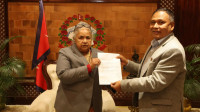National
Nepal’s air pollution among worst
Nepal continues to rank among the worst four performers in protecting the human health and environment due to degrading air quality.
Nepal continues to rank among the worst four performers in protecting the human health and environment due to degrading air quality.
The latest Environment Performance Index (EPI) 2016 released this week at the World Economic Forum puts Nepal 177 among 180 countries in terms of air quality. India, China and Bangladesh are the only countries performing worse than Nepal in an effort to improve the dramatic decline in air quality—a leading cause of death worldwide—accounting for 5.5 million deaths in 2013.
It has ranked Nepal 149 among 180 countries, in overall performance. Finland is ranked on the top with Somalia in the bottom in EPI ranking released biennially. The previous EPI ranked Nepal at 139 in 2014.
The index, a Yale University-based initiative, measures national and global protection of ecosystems and human health from environmental harm, draws out trends and highlights data gaps in priority areas including air quality, water management, and climate change.
Under the air quality, one of the nine assessment areas to determine the overall EPI ranking, the exposure to fine particulate matter (PM2.5), nitrogen dioxide, and percentage of the population burning solid fuel indoors were measured. The particulate matter (PM 2.5) is considered one of the most harmful air pollutants that lodge into human lungs and blood tissues, increasing the chances of lung cancer and other life-threatening respiratory diseases, among others.
“Air pollution has emerged as a biggest environmental health risk for the country, particularly for Kathmandu where the rapid urbanisation and population growth makes the situation even worse,” said Dhiraj Pokharel of the Society for Legal and Environmental Analysis and Development Research (Leaders Nepal), an NGO working on indoor air pollution. Over the years, the government has made no significant effort to improve the air quality and mitigate the risks except for introducing policies and programmes but lacking implementation, he said. “We are still struggling to have a research on identifying the sources of harmful air pollutants, and level of exposures to human life,” Pokharel said.
The EPI report says that 75 percent of the total populations in Nepal and India are exposed to unsafe levels of fine particulate matters as air pollution is a growing global problem. It situation is worse in rapidly developing economies like China and India than in wealthy and very poor countries. The report mentioned that many Asian and African countries have not fared well in addressing environmental problems, including air quality as all have broad governance problems with long, troubled legacies. “Only well-functioning governments are able to manage the environment for the benefit of all,” the report added.




 5.44°C Kathmandu
5.44°C Kathmandu







%20(1).jpg&w=300&height=200)





